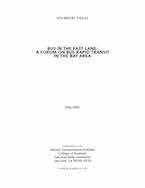- 408-924-7560
- mineta-institute@sjsu.edu
- Donate
Bus in the Fast Lane: A Forum on Bus Rapid Transit in the Bay Area
Bus Rapid Transit (BRT) is a relatively new concept that uses advanced technology, along with different scheduling and operating techniques, in an attempt to make buses a more effective public transportation mode--at a lower cost--than other alternatives. There are only a few working examples of BRT in the United States, one of which is in the San Francisco Bay Area.
Advocates say that rapid bus systems can be deployed for $100,000 per mile and BRT dedicated Busway systems for $1 million per mile. This is compared to $100 million per mile for light rail systems and over $350 million per mile for subways such as BART (Bay Area Rapid Transit).
Opponents say rapid bus is like the camel's nose in the tent, soon to be followed by the whole beast--under-utilized dedicated bus lanes that will further restrict already congested automobile traffic. Critics also fear that businesses may lose parking and be hurt during construction, and local agencies may inherit unknown maintenance costs.
This Mineta Transportation Institute Hot Spot Forum examines these issues in an effort to achieve consensus through information exchange between transportation experts and community representatives.
-
Contact Us
San José State University One Washington Square, San Jose, CA 95192 Phone: 408-924-7560 Email: mineta-institute@sjsu.edu






